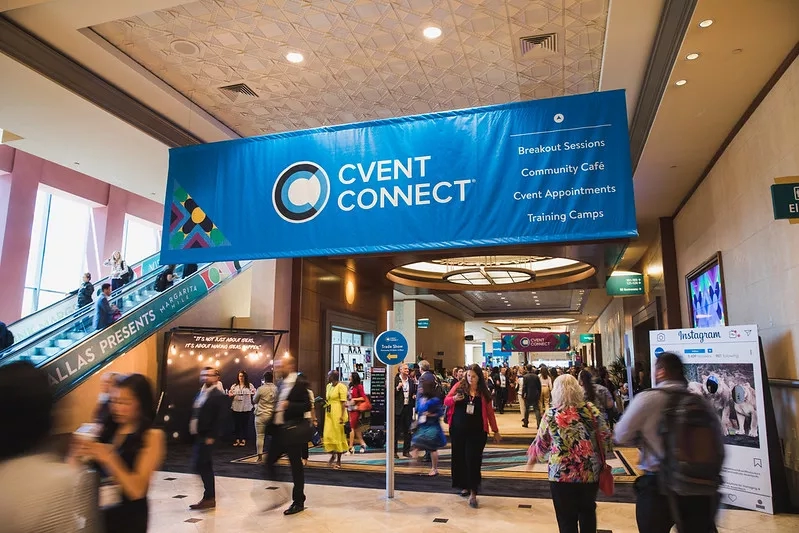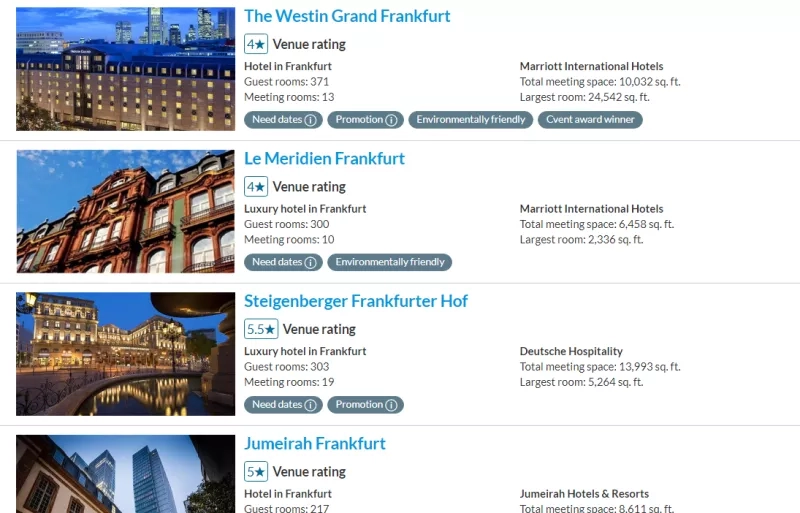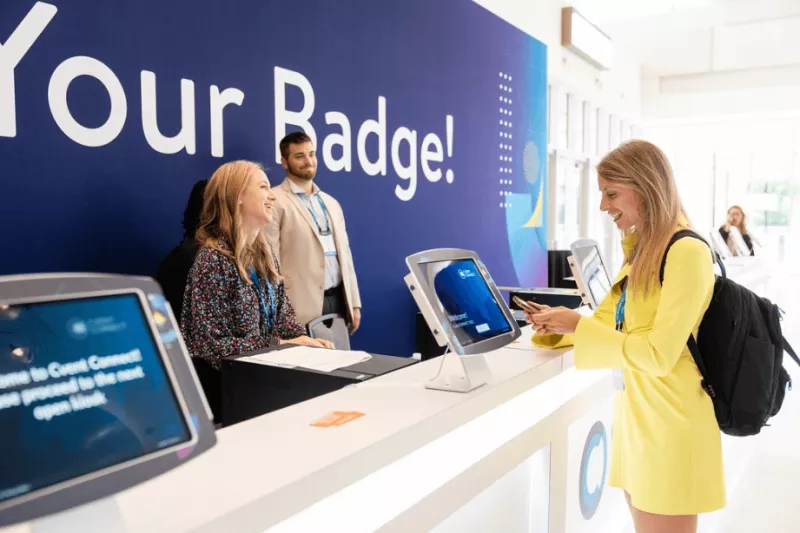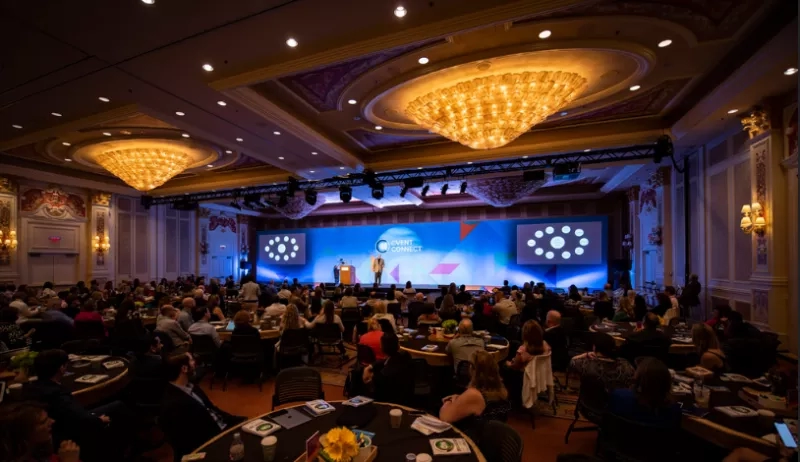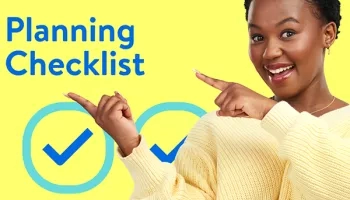
Events in a corporate environment are often staged to communicate company strategy, change internal company behavior, launch a product or service, motivate, train or reward staff, or influence the external behavior of customers towards the brand.
In many instances, they bring company employees together, support wider marketing or sales initiatives, incentivize team achievements, or entertain senior leaders.
What Is Corporate Event Planning?
Yet, corporate event planning goes beyond meeting planning. Although conferences and meetings may form the lion’s share of the workload, other events you may be asked to organize include corporate hospitality, client entertaining, conventions, exhibitions, and employees events—such as incentive travel reward programs, team building, motivational events, receptions, parties, and charity fundraising days.
Planning and executing a successful corporate event is no simple task. It’s typically a months-long process consisting of several stages and a variety of organizational steps.
To help you navigate the business of corporate event planning, here is everything you need to know:
Types of Corporate Events
As outlined above, corporate events can range from company conferences and internal training seminars to team away-days and client hospitality. When planning for any type of corporate event therefore, it’s best to assess them in terms of their size.
Micro events (otherwise known as ‘simple events’) are planned for up to 100 delegates and often take the form of meetings or more intimate training sessions.
The planning requirements for these micro-events may simply involve a room booking, presentation facilities, break-out refreshments, and registration. However, referring to them as ‘simple events’ can be misleading, as an away-day or hospitality for 50 senior managers can be as complicated as planning a conference for 500 attendees.
Small events are classed as between 100 and 250 delegates. They could be seminars, town halls, training days or departmental conferences.
Planners may need to manage a main stage itinerary and several break-out sessions, along with lunch, refreshments, audio-visual facilities, online registration, and transport.
Midsize events rely more on technology. They could be company-wide conferences for up to 1,000 delegates or leadership summits for important client customers to meet with senior leaders.
A branded website, pre-event communications, and an event mobile app should all form part of the budgetary considerations. Delegates may require hotel accommodation, plus transport which takes attendees to and from the venue. While a pre- or post-event reception or evening entertainment may be required as part of a complex multi-stream conference itinerary.
Large-scale events often require enterprise technology tools to manage elements such as hotel room bookings, delegate flights, budgets, and online registration.
These may be multi-day events so you could need offsite activities, dinners, partner programs, an awards ceremony or other complex itinerary planning.
Staffing, catering, registration, speaker and delegate management will all need to be carefully planned at scale. Conventions, for example, can attract anything up to around 10,000 attendees and can last a few days.
Event Budget
The amount of available budget can impact every aspect of corporate event planning, from the choice of venue and speakers to the levels of catering, entertainment, technology, and staffing.
Decide if your budget has outgoings only, or will you be able to supplement it with income from exhibitors, sponsors or other forms of external revenue?
Has this event happened in the past? If so, use the previous budget to establish a baseline but ensure that inflation and evolving needs are taking into consideration.
Figures from past budgets are useful in providing a clearer picture of how much certain suppliers will charge. Use these to ensure you are not being over-charged when you reach out to suppliers for initial quotes.
Every event budget, however, needs built-in flexibility. Unanticipated expenditure is common and supplier costs are often provided as estimates, rather than fixed prices, so it’s vital that an overall budget is managed accordingly, and a contingency fund is in place.
Once you’ve sourced supplier costings, make a comprehensive list of all the budget line items in the event lifecycle, including venue hire, AV, food, and beverage, accommodation and travel, speaker fees, staffing costs, marketing and service fees.
For larger or more complex budget planning, look into corporate event management software suites, which include a dedicated event budget management tool. This will ensure accurate collection of your budgetary information, help you track expenses easily, generate budget reports, and demonstrate the ROI of your event.
Event Objective
‘What is the event’s objective?’ This should be the first question you ask when a corporate event is requested. By gaining a deep understanding of the deliverables that key stakeholders are hoping to achieve, it’ll allow you to plan more effectively and communicate your ideas in a language your bosses will understand.
Once you’ve understood whether the event’s aim is, for example, to build brand awareness, communicate business strategy, reward and motivate, or launch a new product or service, you can then set goals, put the right metrics in place to track results, and determine who the attendees will be, along with their expectations.
When you have well-defined goals and objectives for your event, planning, promoting, and sticking to your budget all become much easier.
Event objectives should be SMART
- Specific: What is the desired outcome and when does it need to be achieved by?
- Measurable: Return on Investment or Return on Objectives… or both?
- Achievable: Ensure that the event objective is something that can actually be achieved otherwise senior leaders will consider it a failure.
- Relevant: The overall objective needs to remain something that relates back to the company’s goals throughout the entire planning process.
- Timebound: Plan for the event objective to have been achieved between two time periods. This may require subsequent training seminars or a follow-up event to assess the outcomes of the first.
Venue Sourcing
The event’s objectives may also determine your choice of venue. If stakeholders are looking to leave a lasting impression on valued or prospective clients, for example, the venue will need to play its part and deliver a memorable wow factor.
Other factors that will influence your venue choice include budget, capacity, location, availability, and logistics. Having a clear understanding of these event requirements will allow you to shortlist a number of venues, send out requests for written proposals (RFPs) and arrange site visits.
Some venues offer seasonal pricing, so the hire cost may be lower during certain times of the year. Find out what the costs are for your venue of choice on your desired date. If your dates are flexible, you may be able to secure a better deal at your preferred venue.
If your event has a short-lead time, keep an eye out for last-minute venue offers as there are often great deals to be found. If you’re planning an event that’s a long way off, consider those venues undergoing refurbishment or not yet opened. They’ll be eager to secure your business and may be able to negotiate more favorably.
Three Steps to Venue Sourcing
Step One: Find Venues
- Know the meeting objectives and requirements. By determining these at the outset, you’ll decrease the search process.
- Take into account feedback from attendees. Is this an annual event? If attendees ranked the venue from the previous year poorly, look at the feedback to pick a venue that will resonate better.
- Don’t feel alone. Reach out to your team, or others that have a stake in the event to brainstorm what factors are most important.
Step Two: Write the perfect RFP
- You already know general objectives and requirements – now define your purpose. Make it clear what this event requires and hopes to achieve.
- Get detailed. Give as much information about the event as you can.
- No one likes to discuss money, but you need to share your budget requirements. The venue is one of the largest costs of an event and can make or break your budget.
- Make your deadlines clear. Give a date and time that provide venues enough time to respond.
- Don’t start from scratch. Pull a template the internet.
- Be ready to answer any questions venues may have about the proposal or event.
Step Three: Send and evaluate proposals
- Using a venue sourcing tool, you can search and filter venues and send one RFP to multiple venues at once.
- Assess proposals via the chosen venue sourcing tool or by manually importing data into a spreadsheet
- Create a list of any factors that are less concrete – the qualitative factors.
- Pay close attention to meeting rooms – do the sizes and layouts make sense for your event?
- Compare how responsive and helpful the venues are to help figure out how helpful they’ll be if you choose them.
Now go on some site visits. You should be in great shape at this point. You have proposals, you know that the spaces you’re looking at are within budget and have the spaces you need, now you can look in person.
Event Marketing
By building a marketing campaign around your event, attendees and stakeholders will feel more invested and involved. It will also allow you to communicate key instructions and announcements, safe in the knowledge that your audience is already engaged.
Event marketing assets include teaser emails, social media channels, a branded website, and a mobile event app. You may also wish to design and create posters, flyers, pin-badges, and other accessories to keep the event front-of-mind and anticipation high.
A customized pre-event website will showcase event highlights and build on the notion of ‘experience’ before attendees arrive. A website can also be used to streamline the registration process and create a one-stop-shop for accommodation or transport booking.
The design and usability of your event website will be crucial to the success of your event, so make sure you pay special attention to how it is designed and built.
With the latest corporate event management software solutions, creating a custom event website has become easier than ever. There is no technical expertise required, and you certainly don’t need to learn HTML. With a simple drag-and-drop tool, you can build a complete website from scratch.
A branded mobile event app meanwhile will allow attendees to view the agenda, receive notifications of scheduling updates and plan networking. It will also enable you to signpost attendees to important information like the venue Wi-Fi password, sponsor information, local hotel details, or session sign-up pages.
On-site advertising should also be included in your marketing plan, which includes signage, banners, flyers and brochures, and other event collateral.
Attendee Engagement
According to a survey by Cvent and Edelman Intelligence, attendee expectations and needs differ significantly on the basis of their persona, age, and region.
For example, the event expectations for a Millennial from the UK could be entirely different from a Baby Boomer from Germany. To deliver a unique and engaging experience for every attendee, you need to have a solid event management plan in place, supported by a strong digital strategy.
If a corporate event cannot generate engagement, it will impact the attendees’ ability to retain information.
The human attention span has reduced significantly in this mobile-first, digital era. As a result, corporate event planners have needed to move away from ‘death by PowerPoint’ presentations to more innovative session formats that avoid information overload.
Using the right event technology tools, implementing feedback strategies like live polls, reconciling goals and expectations, and staying authentic should all be top priorities.
Plenary sessions should be designed for delegate participation. To do this, find more engaging speakers, use live polling, real-time Q&As, table discussions, and other methods of keeping engagement high and attendee attention focused.
Conference breakouts should be designed to provide targeted and truly interactive content for your audience. A common event planning pitfall is to turn them into mini keynotes.
Two popular formats for breakouts are:
Breakout sessions: This format is generally used for conferences or sales rallies and offers participants an opportunity to delve deep and explore a topic of interest.
Breakout groups: Pairs, trios or small groups of up to 12 participants work together to brainstorm, complete a business exercise or analyze a specific business issue. Breakout groups are also used for skill practice during training and development programs, as well as projects during team building sessions.
Coffee and lunch breaks meanwhile should be designed for networking. So, consider icebreakers, buffet stations and other free-flowing formats and activities to get people talking.
A strong digital strategy will build a sense of community before and after the event. Online communities can be formed via social media platforms or by ensuring that your event app is available well in advance and includes built-in social features.
The week before your event is crucial for building attendee engagement for your event.
In order to keep the energy and excitement going, create a unique countdown in the form of emails or website updates, with engaging content such as quiz contests with attractive awards, a preview of the main keynote speakers or any number of other possibilities.
The big four types of attendee engagement
1) Engaging with content: This means giving attendees the right sessions, exhibits and other activities to maximize learning and the value of their attendance.
2) Engaging with each other: For many, networking is the primary reason for attending an event. By creating networking opportunities — whether face-to-face or virtual, one-on-one or in groups — planners can encourage and facilitate networking and create a more valuable experience for attendees.
3) Engaging with sponsors: If you’ve sold sponsorship at your event, then those paying customers will be looking for real connections with the right kind of attendee — rather than just signage.
4) Engaging with you: Communication is a two-way street, and as the event organizer you’ve got to effectively communicate with your attendees — whether for promotional, consultative or logistical purposes.
Virtual Meeting and Event Planning
Not all corporate events need to be in-person. Virtual meeting and event planning is a great choice for these types of events. If you decide on a virtual event, you will need to ask yourself a few questions. Are you planning on a more collaborative environment? Does your technology allow you to do this? And if it's a virtual event, do you want it to be casual or formal? Is the content engaging? And does your technology support networking opportunities? While the planning process doesn't vary much from in-person to virtual, the main difference will be in the production and presentation of your content, as well as the virtual technology used.
Corporate Event Planning Checklist
Use these 21 action steps, together with the aforementioned best practice advice, to ensure effective and successful corporate event planning.
- Determine the overarching goal and the primary objectives you intend to meet by holding this event.
- Identify the audience to determine the event’s tone of voice and what takeaways they’ll expect.
- Agree on how the event fits into the overall company strategy. What are its long-term objectives?
- Make a comprehensive list of all the budget line items in the event lifecycle.
- Appoint a planning team and allocate responsibilities.
- Establish a schedule for planning meetings.
- Decide on the date(s) when the event will take place.
- Prepare a preliminary budget based on historic costings and supplier quotes.
- Create a list of venue requirements.
- Compare venues and negotiate.
- Plan the event layout.
- Secure speakers.
- Develop and activate an event marketing plan.
- Prepare an event timeline allowing adequate time between sessions and activities for transitioning, as well as for any potential delays or technical difficulties.
- Reserve accommodation and transport requirements.
- Plan menus for meals and refreshments, taking dietary needs into consideration.
- Prepare and print event collateral.
- Confirm or recruit event staffing.
- Rehearse speakers if required.
- Follow-up with speakers and attendees post-event to thank them for attending and provide key takeaways.
- Conduct surveys, secure feedback and collate final costings for future reference.


